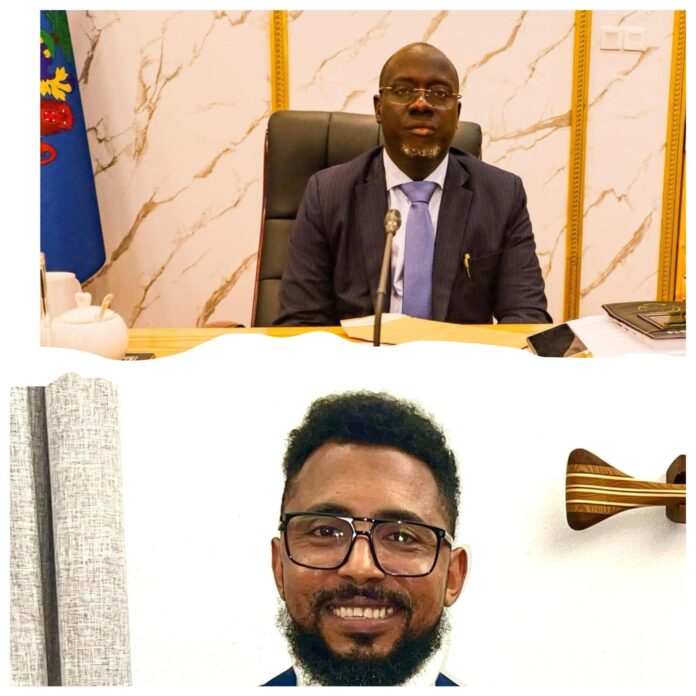By Modou Nyang, MPA, MACP | Gambian citizen and public service professional
The recent uproar over the GMD 3.6 million allocated to support the Gambian president’s mother during travel abroad has evolved into more than a financial debate—it’s now a defining moment for governance, transparency, and fairness in our country. When top officials defend such expenses without clear legal or policy grounding, the issue becomes less about figures and more about the message it sends to a nation still working through the growing pains of democratic accountability.
Hon. Mod K. Ceesay, Minister for Presidential Affairs and Chief of Staff in the Office of the President of The Gambia, confirmed that GMD 1.4 million was eventually approved, primarily to cover per diems for six accompanying personnel. But his clarification only sharpens the concern: how are these requests evaluated, logged, and defended within a financial system that should be rooted in transparency and lawful procedure? Folding loosely justified or unrelated expenditures into one ambiguous memo weakens the core tenets of fiscal discipline and accountability—two foundations no democracy can afford to neglect.
Mr. Ceesay’s years of service in public finance and oversight command respect, but with that respect comes greater responsibility. As someone entrusted with stewarding public funds, he must exemplify not just technical compliance, but also ethical leadership. Simply asserting that a cost falls within legal boundaries isn’t enough; the process must be clear, authorized, and above all, principled.
The 1997 Constitution of The Gambia outlines specific parameters for public spending. Article 218 grants the National Assembly authority over all government expenditures, requiring them to be defensible, transparent, and open to public examination. Nowhere in our Constitution or financial management regulations is there any allowance for unelected relatives of public officials to receive government-funded travel or staffing. While Gambian culture—like much of Africa—holds elder care and family honor in high regard, those traditions cannot override established laws and fiscal standards. Governance must be led by rules, not customs.
Global frameworks such as the Public Expenditure and Financial Accountability (PEFA) program highlight the importance of clear budgeting, lawful spending, and mechanisms for external scrutiny (PEFA Secretariat, 2016). The explanation given in this case did not meet any of those thresholds. There was no legal citation, no reference to public guidelines, and no evidence of audit oversight—leaving the expense on shaky governance and fiduciary grounds.
Mr. Ceesay’s comparison to the British monarchy—citing financial support for the Queen Mother—misses the mark both factually and structurally. The British Royal Family operates under the Sovereign Grant Act of 2011, which clearly spells out entitlements and subjects them to rigorous oversight by Parliament and the UK National Audit Office (HM Treasury, 2011; UK House of Commons, 2002). Funding for royal family members, including the late Queen Mother, followed formal procedures like the Civil List system, now replaced by the Sovereign Grant. These mechanisms are transparent, audited, and debated publicly. Contrasting that to The Gambia’s opaque approval process is not only misleading—it detracts from the critical governance failures at play.
A more appropriate point of reference is Senegal, a neighboring country with similar cultural roots and often cited by Gambian officials, including Mr. Ceesay, as a standard for good governance. In Senegal, the Cour des Comptes conducts constitutionally mandated audits of executive spending and makes its findings public. The government also uses an Integrated Financial Management Information System (IFMIS) to track public expenditures in real time, accessible to auditors and civil society (World Bank, 2023). In Senegal, presidential family members only receive travel funding if they’re officially designated as part of a delegation—and that information is disclosed. That’s not governance by convenience; it’s governance by design.
This entire episode also casts a harsh light on a long-standing issue: the fragility of The Gambia’s healthcare system. In defending the funding decision, Mr. Ceesay acknowledged that local hospitals were not equipped to meet the President’s mother’s needs. Yet, in the same breath, he claimed the current administration has done more for healthcare than any prior government. Without data or indicators to support that, the statement lacks substance—especially in the face of persistent gaps in access and quality of care.
What’s more troubling is the pattern this suggests—where senior officials, including the President, routinely seek treatment abroad, bypassing the very health system they praise. This double standard sends a loud message: the system isn’t good enough for them, but it’s good enough for everyone else. When leaders avoid the public services they promote, they erode the trust that holds the social contract together.
This isn’t just a matter of public perception—it strikes at the heart of civic integrity. Leadership requires that public responsibility be reflected in personal choices. If the President’s mother deserves comprehensive, dignified care, then so does the woman in Janjanbureh who walks miles to a clinic lacking basic medicine. If the government truly believes in its health reforms, it should lead by example. Anything less reinforces a culture where privilege, not need, determines access.
According to the World Health Organization (2022), The Gambia has only 5.9 health workers per 10,000 people—far below the global benchmark of 44.5. Many rural hospitals report frequent medicine shortages, and the country struggles with high maternal mortality and poor infrastructure. These aren’t just statistics—they’re a call to action for real, structural reform.
Again, Senegal offers useful insights. Its Couverture Maladie Universelle (CMU) now covers over half the population, thanks to sound policy, decentralization, and transparent oversight (UNDP, 2021). In Senegal, international medical referrals are subject to clear rules and strict vetting. The Gambia has no such framework in place.
Real reform demands more than defensiveness—it requires vision and commitment. The country needs a clear, public policy on entitlements for the executive and their families: who qualifies, under what circumstances, and with what oversight. It also needs a fully digitized, real-time financial tracking system to monitor public funds. The Ministry of Health should commission an independent review comparing its outcomes to global standards. And a national health insurance scheme must be implemented—one that guarantees equitable, dignified care for every Gambian, regardless of income or geography.
Public service isn’t just about legal compliance—it’s about public trust. Citizens must believe that their leaders act not out of privilege, but from a sense of duty. When unelected relatives of those in power receive benefits the average citizen cannot access, it corrodes confidence in our institutions. Democracy thrives not on rhetoric, but on systems that serve all citizens fairly and transparently.
The Gambian government must serve its people—not protect the elite. It’s time to move from privilege to principle. It’s time to raise the bar.





